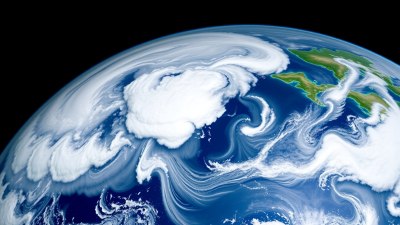Why You Secretly Enjoy Weather-Related Drama More Than You Admit
Explore the hidden thrill of weather-related drama and why it captivates our attention more than we realize.

Image by wavebreakmedia-micro on Freepik
When the skies darken and the winds pick up, there’s a certain thrill in the air that many of us can't deny. Weather-related drama, whether it's a breathtaking thunderstorm, a fierce hurricane, or even snowfall that brings the world to a standstill, often captivates our attention in ways we might not fully admit. But what is it about these atmospheric phenomena that sparks such fascination? Is it the chaos, the unpredictability, or perhaps something deeper? Let's explore the reasons why we might secretly enjoy weather-related drama more than we admit.
The Element of Surprise
One of the most thrilling aspects of weather is its unpredictability. Meteorologists work tirelessly to provide accurate forecasts, yet Mother Nature has her own plans. When a serene day turns into a sudden storm, that element of surprise can be exhilarating. People often seek out this thrill, whether consciously or subconsciously, as it adds a level of emotion and excitement to daily life. The dramatic transformations visible in the skies from bright sunshine to ominous clouds compel us to pay attention, igniting our instincts to be aware and react.
Connection to Nature
Weather is a direct link to nature that reminds us of our own humanity. We often crave these connections, whether through the majesty of a rolling thunderstorm or the beauty of falling snow. Such moments encourage introspection, giving us time to reflect as we witness the sheer power and beauty of the natural world. This connection can evoke strong emotional responses—fear, wonder, and even nostalgia, depending on our past experiences with similar weather conditions. We feel alive when the weather turns dramatic; it’s a visceral experience that reminds us we are part of something larger.
The Comfort of Community
Weather-related drama often serves as a social catalyst. Whether it’s discussing impending storms with neighbors or sharing photos of an unexpected snowfall on social media, people tend to come together in times of weather-related chaos. This shared experience creates a bond among individuals who might otherwise remain strangers. There’s comfort in knowing that we’re not alone in facing a storm; the community rallies together, providing support to one another during trying times and creating a sense of camaraderie that many cherish.
The Drama in Drama
We love storytelling, and weather provides a brilliant backdrop for dramatic narratives. Think of all the films and literature that center around the tumultuous forces of nature—tornadoes, floods, and storms not only serve as metaphors for inner conflict but also drive plot points and character motivations. This storytelling aspect is something we subconsciously relate to. We often find ourselves swept up in the thrill of these narratives, whether we're watching a disaster movie or listening to a friend recount their close encounter with a weather event. These stories are imbued with lessons about resilience and the human spirit, making the experience feel richer.
The Influence of Social Media
In our digital age, social media plays a significant role in how we experience weather-related events. We frequently see updates, photos, and live broadcasts of extreme weather conditions, all of which heighten our anticipation and excitement. User-generated content allows us to engage with the phenomenon in real-time, fostering a sense of urgency that can be electric. As we scroll through posts and tune into live feeds, we find ourselves caught in a collective excitement that amplifies our enjoyment. This virtual engagement may offer immediate satisfaction, where likes and shares make us feel part of the bigger picture.
Weather as a Break from Routine
For many, extreme weather signals a break from the mundane routine of everyday life. A snow day means unexpected time off work or school; a thunderstorm might evoke a cozy evening spent indoors. These interludes provide opportunities for spontaneity and adventure, something often lacking in predictable daily schedules. When weather dramatically alters our plans, it gifts us an unexpected break, where we can embrace the chaos or simply enjoy an extended period of leisure. This unpredictability can rejuvenate us in a world that sometimes feels painstakingly mundane.
The Psychological Effects of Watching Weather
Psychologically, there is a phenomenon known as 'schadenfreude,' which is essentially taking pleasure in the misfortunes of others. When particularly harsh weather conditions affect others, watching people navigate those situations can evoke complex feelings. While it's uncomfortable to admit, there’s a thrill in witnessing others face challenges, especially when we are safe and sound ourselves. We might not wish harm upon anyone, but the tension and drama associated with severe weather events often draw us in—how will people cope? How do they adapt? What will happen next? This sense of voyeurism can be hard to resist.
Amplified Emotions and Reality TV
Reality TV has rooted itself deeply in weather-related drama. Shows that spotlight storm chasers or those preparing for impending hurricanes captivate us. As we watch these individuals face the intensity of weather, we are often gripped by fear, curiosity, and admiration for their bravery. This creates an emotional roller-coaster that provides entertainment, and we can't help but feel the adrenaline alongside them. The dramatization of these events, whether through film or television, often enhances our viewing pleasure, turning what might be a simple weather report into a gripping saga.
Understanding Nature's Power
Perhaps one of the most common reasons we enjoy weather-related drama is the opportunity it provides to witness nature's power first-hand. Extreme weather events demand our respect and admiration; they highlight the incredible forces that shape our planet. When we observe grandiose lightning displays or raging hurricanes, we gain insight into the natural order of things. Acknowledging our vulnerability in the face of such might prompts us to rethink our existence and our relationship with nature. It makes for awe-inspiring moments that both humble and excite us, drawing a fine line between entertainment and reverence.
Embracing the Thrill
In conclusion, our enjoyment of weather-related drama runs far deeper than mere fascination. It encompasses a range of psychological factors from our need for connection, community, and storytelling to our intrinsic desire for excitement and emotional release. Whether we welcome a storm, engage with our communities, or immerse ourselves in nature’s awe-inspiring force, we inadvertently welcome the thrill that accompanies dramatic weather. So, the next time you find yourself glued to the window, watching the clouds form, know that you are partaking in an age-old human experience—an appreciation for the unpredictable dance of the elements.











